The Elder Scrolls Online review in progress
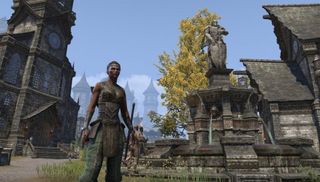
The Elder Scrolls Online launched last Friday. Chris' review of the game will be published following at least a week of play on the game's live servers. This 'review in progress' will document his experiences with the game as they happen. Find the first part below, check out page 2 for Saturday's update, and page 3 for the third part. The final part is available here .
Level 1-4
My time in the live version of TESO begins a few hours later than I'd hoped. The PC that I use to test games in the office has a hard drive failure before I can start playing, so I rush home to play the game there. By the time I begin, it's midday on the day of the game's launch. If there were ever going to be a time when an MMO wasn't going to work properly, it'd be now—but to TESO's credit, I experience no problems getting connected.
Having played the game a few times in earlier versions, I know what character I'm going to make. The first time I played TESO was at a preview event a year ago, when I played a Daggerfall Covenant character up to level six or seven. I'm interested in charting the same course to see how much has changed since then. It turns out that a lot has, and not all of it for the better.
I create a Redguard Dragonknight, a melee tank with access to damaging and defensive magic. Character customisation has a lot of depth—more so than most games in this genre—and the range of body types available in particular provides a lot of room to give your character a distinctive silhouette. That said, I struggle to create a face with personality. There are plenty of sliders to tweak, but only a few seem to have a really perceptible impact. Characters in TESO tend towards a kind of bland prettiness. This flaw is something it shares with a lot of other MMOs—and a lot of other Elder Scrolls games—but it's still a flaw. I settle for using the 'Eye Squint' bar to give my character an expression that could pass for a hardened middle-distance stare. The whole process takes about twenty minutes, but I'm the type of player who tends to lose a lot of time to character creation in RPGs.

TESO's tutorial section has you escape from prison in Coldharbour, a very very grey plane of Oblivion presided over by Molag Bal, the game's daedric antagonist. After collecting my weapons of choice—a sword and shield—I'm taught combat by battering a few skeletons. Fighting has been improved since the beta: weapon blows seem to be emphasised more in the audio mix, and you can no longer clip freely through any other characters. It's still weak compared to Skyrim, but it's better than it was. That said, I remain pretty unconvinced by the game's first-person mode. There's very little sense of connection, and the red shapes used to telegraph enemy attacks are much easier to see with the camera pulled back. I zoom out to an over-the-shoulder view and stay there.
In this sequence you are introduced to a nord warrior called Lyris, played by Jennifer Hale, and a mysterious prophet played by Michael Gambon. There's an early cameo by John Cleese, too, playing a quote-unquote "wacky" prisoner of Coldharbour who serves to direct you from one corridor to another. Bethesda's casting budget carpet-bombs the sequence in a way that is honestly very distracting: rather than be drawn into this world and its characters, I find myself wondering instead about how much it all must have cost. This isn't helped by very rudimentary facial animation, which traps acting talent behind a looping range of unblinking gurns. I never thought I'd say this about the game, but Oblivion had more convincing people.
Comic deals, prizes and latest news
Sign up to get the best content of the week, and great gaming deals, as picked by the editors.
It's not an inspiring start, then. There's something off about the pace—you're asked to believe that you're the key to solving a world-ending crisis but given no sense of what that really means. You're told that you're taking part in a mass slave uprising but most everybody else you see is hovering around like it's no big deal. Coldharbour itself is alien but drab. It's supposed to be Tamriel's dark mirror, but there's little to differentiate it from any other gothic fantasy dungeon.
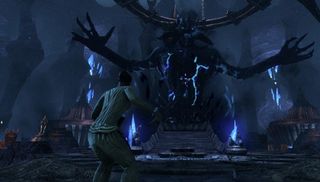
I'm glad to get to the portal that leads to Tamriel proper. In the beta, leaving Coldharbour deposited you on one of three starting islands depending on your choice of faction. Bethesda have tweaked the system to speed up TESO's pace: now, you begin in a house in your faction's capital city with the option to go and do those beginning quests if you desire. I understand this decision on paper, but its execution causes problems.
When you wake, you're visited by the prophet who appears to tell you what to do next. It was obviously necessary to record some new dialogue to reflect the change in starting location, and whoever does the voice of the prophet for this particular conversation really, really doesn't sound like Michael Gambon. It could be him, I suppose—the difference could be down to recording the dialogue at a later time. But I'm genuinely taken aback by how different it sounds, given that I'd been listening to the character only minutes earlier. It's a small point, ultimately, but a strong first impression is important in a game this hotly anticipated. I don't feel filled with confidence by this early dip in TESO's production value.
The version of the game I'm using comes with a few additional extra pets and items, which are delivered by mail. I've also got a monkey companion for participating in the beta. My plan is to deposit all of this extra stuff in the bank in Daggerfall and then head to Stros M'Kai, the Daggerfall Covenant starting island. I remember liking the quests and characters in that area, and I want to give the personal story the chance to start as strongly as it can.
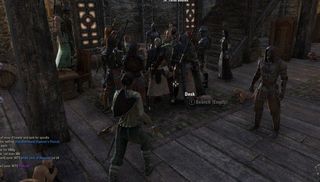
Daggerfall is very busy, and I experience periodic freezing as I run around. I get 60fps indoors on max settings using a mid-range system, but outside it seems to hover around 30fps with the occasional hard pause. It's playable, but distracting. In the bank, the single banker NPC is surrounded by dozens of players. In the corner, an argonian called 'Shitt in pants' is playing a drum slightly out of time. This is definitely an MMO.
I drop off my monkey and run to the marketplace to sell some of the starting equipment I no longer need. Along the way I attract the attention of a quest-starting dog, who I decide to follow. He leads me to a quest that I remember taking place much later in the Daggerfall Covenant arc, but that has obviously been brought forward to account for the change in the starting experience. The dog leads me to a body, which leads to a battle with some assassins, a murder plot, and an attempt on the life of the king of Daggerfall. Before my first two hours are up I've become the hero of the city, and all I did was follow a dog.
I've got mixed feelings about this change in structure. On one hand, NPCs trusting fresh-off-the-boat strangers with vital tasks is a quirk of the genre, and I appreciate having had the freedom to encounter the quest on my own terms. On the other, the game has done nothing to establish the themes or relationships that are needed to give these events context—context that would be provided by the starting questlines that I already appear to have skipped.

In terms of minute-to-minute combat, however, things fare a little better than they did in the beta. I've specialised in earth magic, which allows me to interrupt enemy special attacks with a knockout blow. I use this in conjunction with a series of armour-reducing sword moves to build up steady damage on an opponent who can't get any hits in themselves. It's not wildly different to any other kind of MMO combat rotation, but I like that I've been able to come up with it myself.
I do, however, encounter a problem when I die during the assassination attempt on the king. I choose to respawn on the spot and this throws the AI for a loop. Enemy assassins no longer respond at all as I chop them down, unopposed, before making my way upstairs to kill their leader.
After completing the quest I head to the Fighter's Guild to sign up. I'm too low level to do their quests, but I do want to grab their skill tree for later. Then, I head to the docks. I already feel like I've broken TESO's narrative arc by getting ahead of myself, so I want to get back on track— but the way the story loops back on itself to get you to the starting island is… confusing.
You're asked to get on board a ship that will take you to Stros M'Kai, where the person who rescued you—Captain Kaleen—is recruiting a new crew. Except Kaleen's ship is in Daggerfall, and the NPC who explains all of this to you intimates that you're already in Stros M'Kai before you've even left. In older versions of the game, Kaleen was stranded in Stros M'Kai when her crew mutinied. TESO still tries to establish that this has happened, but the nuts and bolts of the plot make absolutely no sense—why would she allow the ship to go to Daggerfall? How did it even get there with no crew? Why would they rescue you, drop you off half a world away, and then sail back the way they came?
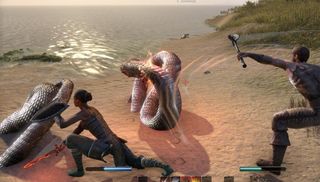
Scripted narrative isn't important to MMOs, necessarily, but worldbuilding is. TESO's scrappy quest structure has thrown off my sense of place, and I'm having to work hard to pull it back. I hope the next couple of hours fare better.
Level 4-8
This sense of disconnect sticks with me long into the Stros M'Kai storyline. It's clear that this is where the game was supposed to begin, and the fact that I've already been to Daggerfall, rescued the king and so on reduces the significance of the characters I'm meeting and the alliances that I'm forming. I do like the way these early quests allow you to pick which characters continue to travel with you, and the way TESO uses phasing to include those characters in the world is clever. But feeling like I've done the game out of order holds me back from really forming an attachment.
I've realised that trying to play TESO for the narrative and world just isn't going to work. This isn't an MMO where the presence of other players enhances your immersion. Given that everybody is working through the same linear series of quests, you see other people everywhere—and normally, they're doing the exact same things you are. Other players add to atmosphere when they provide a sense that the world is a living place, that it would continue about its business without you. In TESO, they reinforce the notion that you've all signed up for the same ride.
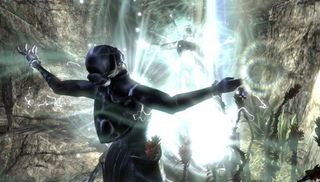
With this in mind I've decided to adjust my attitude and play TESO as I would a less story-centric MMO. This feels like a waste of the setting, but the game is better when you put levelling and combat ahead of immersion. Because you get most of your experience from completing quests, however, there's not actually all that much fighting—at least, not at the point I've reached. After I leave Stros M'Kai, for example, I arrive in the orc island of Betnikh. Two separate questlines involve running from point to point on the map talking to NPCs and watching short cutscenes play out. One involves a short dungeon run later on, but the other is entirely about walking and watching along with crowds of other players doing the same thing. I like the way these quests are used to provide context for the conflict you're engaged in, but they are not mechanically interesting or particularly fun to work your way through.
I am enjoying the game's skill system, though. On Betnikh I unlocked my first Ultimate ability, which allows me to encase myself in lava to reduce incoming damage to a fixed amount while burning enemies around me. I've also 'morphed' several of my sword and shield abilities, which involves levelling them up through use and then picking one of two potential upgrade paths. I now gain armour while taunting and can reduce all incoming damage with a particular blow. I'm heading towards a tanking role, slowly but surely, and while I might be doing the same thing as every other player on the map I feel distinct from them in the way that I approach combat.
After several hours of questing on Stros M'Kai and Betnikh I'm now back in Daggerfall. The main questline is about to pick up a notch—the prophet has been in touch again, this time sounding much more like Michael Gambon—and I'm going to give crafting a go while I'm in the city.
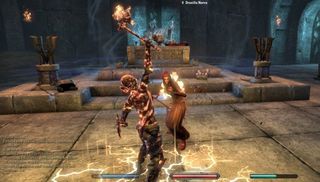
I had not expected to be as disheartened as I was by TESO's opening: having played it before, I felt like I'd set my expectations right. In part, dealing with that disappointment was a case of adjusting my attitude towards the game. I have a lot of patience for MMO genre conventions in the right circumstances. But I wouldn't expect another player to be that generous. If I'd logged into TESO today expecting a sense of immersion on par with other Elder Scrolls games, or a degree of coherence on par with other narrative-heavy MMOs, I suspect I'd be sorely disappointed.
Joining in 2011, Chris made his start with PC Gamer turning beautiful trees into magazines, first as a writer and later as deputy editor. Once PCG's reluctant MMO champion , his discovery of Dota 2 in 2012 led him to much darker, stranger places. In 2015, Chris became the editor of PC Gamer Pro, overseeing our online coverage of competitive gaming and esports. He left in 2017, and can be now found making games and recording the Crate & Crowbar podcast.

Streamer lets viewers add custom voice lines to Skyrim NPCs, immediately realises their mistake: 'I formally apologise and regret my life choices'

The Elder Scrolls Online dev says the 'metaverse' is sinking because it ignored 20 years of games doing the exact same thing: 'It's not new, and they should stop treating it like it's new'
Most Popular





